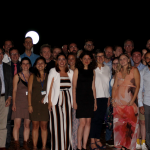From 24–26 October 2019, DCO organised DCO Deep Carbon 2019: Launching the Next Decade of Deep Carbon Science at historic locations in Washington, DC. Nearly 300 members of DCO’s international community convened at the National Academy of Sciences for a lively program of talks, posters, and other activities, representing the culmination of ten years of deep carbon research, exploration, and discovery.
Prof. Alberto Striolo, S4CE project coordinator, presented S4CE activities and latest results during the session on “New Programs Emerging from DCO”. The video of the presentation is available here:
One of the S4CE outcomes is to improve and cross-validate highly sophisticated detection and monitoring technologies for subsurface diffusion of CO2 and natural gas and other substances that may be released through subsurface resource operations.
S4CE builds on the DCO network to enhance and deepen an international dialogue on environmental issues related to CO2 Capture and Storage, geothermal energy and unconventional hydrocarbons development. Craig Schiffries, Director of DCO, is a member of External Science Advisory Board of S4CE and Isabelle Daniel, Work Package leader of Dissemination activities within S4CE, is leader of the Deep Energy community of the DCO and chaired the Science Program Committee at Deep Carbon 2019.
Prof. Alberto Striolo, is a long-time collaborator of Prof. David Cole, Ohio State University, who serves on DCO’s Synthesis Group 2019 and served previously as chair of the Deep Energy Community. What’s more, Dr. Adrian Jones, S4CE Vice Project Coordinator was a founder member of the Deep Carbon Observatory and is on the Executive Committee.
These fruitful collaborations have been a foundation for S4CE.
Thanks to this close collaboration, S4CE has been able to sample and capture under pressure fragments of the subsurface biosphere of the Icelandic field site using novel PUSH50 bio-fluid-samplers developed by and for the DCO community. Some are archived, others have been transferred to the university of Brest for further pressure cultivation, while complementary experimental work is performed at the UCBL on the metabolic activity of key microbial strains. This is also a contribution to the research activities of the Deep Life Community of the DCO.
DCO actively promotes technology innovation (e.g. for volcanic gas sensing), and their standout support for early career participation, e.g. through summer school in 2014 and in 2016. This has led to an exceptional global community of multidisciplinary carbon scientists amongst whom some are installed in key positions to address future issues of climate, energy and carbon.







